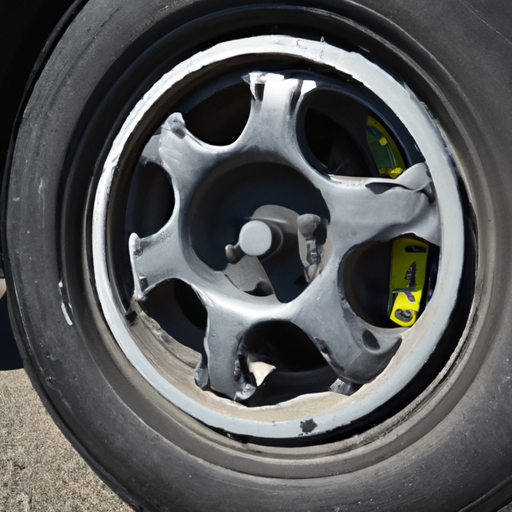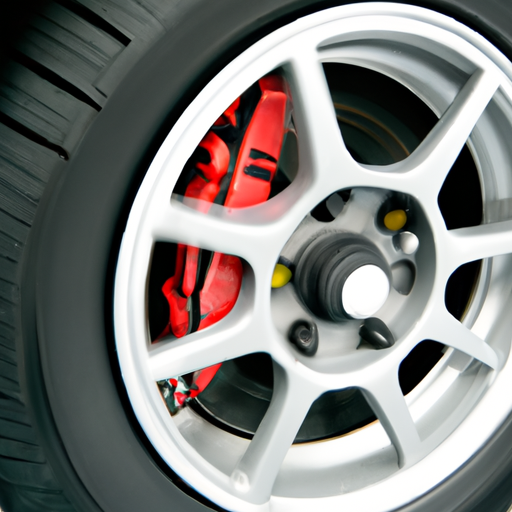Have you ever wondered how the weight of your car’s wheels can affect its overall performance? The impact of wheel weight on performance is not to be underestimated. The weight of your wheels plays a crucial role in various aspects of your vehicle’s performance, from acceleration to fuel efficiency. In this article, we will explore the significance of wheel weight and how it can impact the overall performance of your car. Whether you’re a car enthusiast or simply curious about the mechanics behind your vehicle, understanding the role of wheel weight is essential. So, let’s dive into the fascinating world of wheel weight and its impact on overall performance!
Reduced Acceleration
Increased rotating inertia
When you have heavier wheels, the rotating inertia increases. Rotating inertia refers to the resistance an object experiences when it is rotated. With increased rotating inertia, your wheels require more force to accelerate, resulting in slower acceleration. This can noticeably affect your vehicle’s ability to quickly pick up speed.
Slower acceleration
As mentioned earlier, heavier wheels require more force to accelerate. This means that your car will take longer to reach its desired speed. For drivers who enjoy quick acceleration or need to merge into fast-moving traffic, the added weight of the wheels can be quite frustrating.
Decreased power to weight ratio
Another factor contributing to reduced acceleration is the decreased power to weight ratio. The weight of the wheels adds to the overall weight of the vehicle, and thus the ratio of power to weight decreases. This means that your engine has to work harder to move the car, resulting in slower acceleration.
Decreased Fuel Efficiency
Increased rolling resistance
A significant impact of wheel weight on overall performance is the increased rolling resistance. Rolling resistance refers to the force required to keep the wheels rolling when the vehicle is in motion. With heavier wheels, the rolling resistance increases, requiring more energy to be exerted to overcome the added resistance. As a result, your car’s fuel efficiency decreases, and you may find yourself visiting the gas station more frequently.
Greater energy required to overcome inertia
In addition to the increased rolling resistance, heavier wheels also require a greater amount of energy to overcome inertia. Inertia refers to the tendency of an object to resist changes in its motion. When your vehicle is stationary or moving at a slow speed, the added weight of the wheels makes it harder for the car to get going. This extra energy requirement further reduces fuel efficiency.
Higher fuel consumption
When there is increased rolling resistance and a greater energy requirement to overcome inertia, it’s no surprise that your car’s fuel consumption increases. With heavier wheels, the engine has to work harder, consuming more fuel to provide the necessary power. This results in reduced fuel efficiency and higher fuel costs in the long run.

Impaired Handling and Braking
Increased unsprung weight
Unsprung weight refers to the weight of components not supported by the vehicle’s suspension system, including the wheels. Heavier wheels add to the unsprung weight, which negatively affects the handling and braking performance of your vehicle. The increased unsprung weight reduces the responsiveness of your car’s suspension system, making it more difficult to maintain control while maneuvering.
Reduced responsiveness
With the added unsprung weight, the responsiveness of your vehicle diminishes. This means that it takes more effort to steer the car, and the handling becomes less precise. Quick and precise maneuvers may become challenging, impacting the overall driving experience.
Less effective braking
Braking performance is also impaired by the increased wheel weight. The added weight puts additional stress on the braking system, making it less effective in stopping the vehicle. This is particularly concerning in emergency situations where a prompt and powerful braking response is crucial for safety.
Increased Wear and Tear
Stress on suspension components
Heavier wheels place extra stress on the suspension components of your vehicle. The suspension system is responsible for absorbing bumps and ensuring a smooth ride. When the wheels are heavier, the suspension components are forced to work harder, leading to increased wear and tear. This can result in more frequent repairs and replacements, adding to your maintenance costs.
Excessive strain on bearings
Your car’s bearings are responsible for reducing friction between moving parts, allowing them to rotate smoothly. With heavier wheels, the bearings experience excessive strain, causing them to wear out faster. This can lead to premature failure of the bearings, requiring expensive repairs or replacements.
Premature wear of tires and brakes
Another consequence of wheel weight is the premature wear of tires and brakes. Heavier wheels put more strain on the tires, causing them to wear out more quickly. Similarly, the increased weight places additional stress on the brakes, leading to faster deterioration of brake pads and rotors. This frequent wear and tear can be costly to address and adds to the overall maintenance expenses.

Negative Impact on Ride Quality
Harsh and jarring ride
With heavier wheels, you may experience a harsh and jarring ride. The increased weight alters the suspension’s ability to absorb bumps and uneven surfaces, resulting in a less comfortable driving experience. The added weight can make your vehicle feel stiffer and less compliant, transferring more vibrations and impacts to the cabin.
Reduced comfort
The negative impact on ride quality extends to a reduction in overall comfort. With heavier wheels, the ability of the suspension system to provide a smooth and comfortable ride is compromised. You may feel every bump on the road more acutely, and long journeys can become tiresome and uncomfortable.
Greater susceptibility to road imperfections
The increased weight of the wheels makes your vehicle more susceptible to road imperfections. Potholes, cracks, and uneven surfaces can have a more significant impact on your car’s suspension system, potentially leading to damage or additional wear and tear. This not only affects ride comfort but also increases the likelihood of costly repairs.
Higher Maintenance and Repair Costs
Frequent replacement of worn-out parts
The increased wear and tear resulting from the added wheel weight can lead to more frequent replacement of worn-out parts. Suspension components, bearings, tires, and brakes may need to be replaced more often, driving up maintenance costs. This additional expense can be a burden on your wallet and potentially impact your overall budget for vehicle maintenance.
Increased need for alignment and balancing
Heavier wheels can also disrupt the alignment and balance of your car. Alignment refers to the proper positioning of the wheels, ensuring that they are parallel to each other and perpendicular to the ground. Balancing refers to distributing the weight evenly across all the wheels. With heavier wheels, the alignment and balance can be thrown off more easily, requiring frequent adjustments and realignment.
Costly repairs
The combination of increased wear and tear, along with the need for frequent replacement of parts, can result in costly repairs. As mentioned earlier, the suspension components, bearings, tires, and brakes can be particularly affected by the added wheel weight. The expenses associated with these repairs can quickly add up and strain your budget.

Reduced Maneuverability
Greater steering effort required
With heavier wheels, greater steering effort is required to maneuver your vehicle. The increased weight amplifies the resistance when turning the steering wheel, making it more challenging to navigate tight corners or parking spaces. This increased effort can be tiring for the driver and may diminish the overall enjoyment of driving.
Sluggish response to driver input
In addition to the increased steering effort, heavier wheels also result in a sluggish response from your vehicle. When you make a quick input on the steering wheel, the response may be delayed due to the added weight. This lack of immediate response can affect your ability to quickly adjust your course and could potentially lead to safety concerns.
Difficulty in navigating tight spaces
The reduced maneuverability caused by heavier wheels can make navigating tight spaces more challenging. Whether it’s parking in a crowded lot or maneuvering through narrow streets, the added weight can hinder your ability to handle the vehicle with precision. This limitation can be frustrating and may require extra caution when driving in such conditions.
Increased Risk of Accidents
Reduced control and stability
Heavier wheels contribute to reduced control and stability of your vehicle. The added weight affects the overall balance and center of gravity, making it more difficult to maintain control during maneuvers or sudden changes in direction. This increased risk can lead to accidents, endangering not only yourself but also other road users.
Extended braking distances
The impaired braking performance resulting from wheel weight can also lead to extended braking distances. With heavier wheels, the braking system requires more time and distance to bring the vehicle to a complete stop. This increased stopping distance can be dangerous, especially in emergency situations where split seconds count.
Greater chance of losing control
The combination of reduced control, extended braking distances, and decreased responsiveness can increase the chance of losing control over your vehicle. When faced with unexpected obstacles or hazardous road conditions, the added wheel weight can further hinder your ability to react swiftly and maintain stability. This elevated risk underscores the importance of keeping your vehicle’s wheel weight within optimal limits.

Negative Impact on Suspension
Bouncy and unstable ride
The increased wheel weight can lead to a bouncy and unstable ride. The added strain on the suspension system, particularly the shock absorbers, can cause the wheels to rebound excessively after encountering bumps or irregularities on the road. This bouncing motion compromises the stability of the vehicle, making it harder to maintain control and increasing the chances of discomfort and potential safety hazards.
Increased stress on shock absorbers
Heavier wheels place increased stress on the shock absorbers. These components are designed to dampen the vibrations and impacts that the wheels encounter, ensuring a smooth and controlled ride. However, with the added weight, the shock absorbers are forced to work harder, potentially leading to premature wear and reduced performance. This can result in a less comfortable and more unpredictable driving experience.
Compromised performance of suspension system
The overall performance of your vehicle’s suspension system is compromised by heavier wheels. The suspension components, including springs, struts, and control arms, are designed to work within specific weight limits. When the wheels exceed these limits, the suspension system may struggle to adequately support the added weight, leading to subpar performance, reduced comfort, and potential long-term damage.
Limitations for Performance Vehicles
Lower power-to-weight ratio
Performance vehicles thrive on a high power-to-weight ratio, which indicates the amount of power the engine has to move a given weight. Heavier wheels decrease this ratio, as they add unnecessary weight that the engine has to overcome. The result is lower acceleration, reduced handling capabilities, and diminished overall performance, disappointing enthusiasts who demand exceptional speed and agility from their vehicles.
Decreased handling capabilities
Performance vehicles are known for their exceptional handling capabilities, allowing drivers to confidently tackle corners and curves at high speeds. However, heavier wheels can hinder these capabilities. The added weight affects the balance and response of the vehicle, leading to reduced precision and potential loss of traction. This compromises the dynamic handling characteristics that performance car owners desire.
Diminished overall performance
In the world of performance vehicles, every ounce of weight matters. Heavier wheels have a significant impact on the overall performance of these cars, diminishing their ability to deliver exhilarating acceleration, nimble handling, and precise braking. The compromised power-to-weight ratio, decreased handling capabilities, and other negative effects discussed earlier combine to dampen the overall performance potential of performance vehicles equipped with heavier wheels.
In conclusion, wheel weight has a substantial impact on the overall performance of a vehicle. From reduced acceleration and fuel efficiency to impaired handling and increased wear and tear, the negative consequences of heavier wheels are far-reaching. Additionally, their influence extends to the comfort, maintenance costs, maneuverability, risk of accidents, suspension, and even the limitations imposed on performance vehicles. When considering aftermarket wheels or making any changes that affect the weight of your vehicle’s wheels, it’s important to carefully consider the potential drawbacks and seek an optimal balance between aesthetics and performance.


